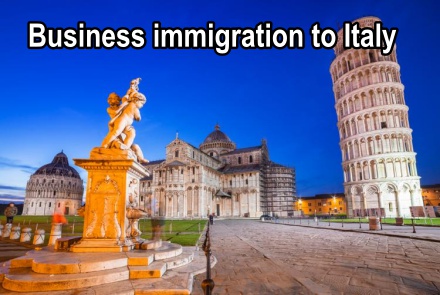Business immigration to Italy in matters.
1. Is there a system of accounting (registration) of employers wishing to hire foreign citizens?
Italian employers wishing to hire an employee who is a citizen of a non-EU country are entitled to enter into an employment contract only if a work permit is received in the name of the employee (Art. 22 of Legislative Decree No. 286/98). Work permits are issued only with quotas. The Italian government periodically allocates a limited number of quotas that are distributed among the Italian provinces.
The above quota system provides for the following exceptions:
- for temporarily seconded employees (since the duration of the appointment cannot exceed four & five years in total, depending on the type of work permit). The condition for such work permits is the fact that the employees remain hired by a foreign company and are sent to work in an Italian company for a limited period (Art. 27, a), f), g) and i) of Legislative Decree No. 286/98);
- for highly qualified specialists, the so-called EU Blue Card system (Decree No. 108/2012).
2. Are there obligations for employers hiring foreign nationals to comply with Italian immigration laws?
Employers must “sponsor” an employee for obtaining a work permit (Law Decree No. 286, Arts 22 to 27 quater; Presidential Decree No. 394, Arts 29 to 41), as follows:
- Italian company - the employer must apply for a work permit;
- The official representative of the Italian company must be an individual resident in Italy.
An application for a work permit must indicate:
(a) whether there has been a collective dismissal (staff reduction) over the past 12 months;
(b) whether there has been a dismissal of workers with a similar level & skills.
Firms may be refused a work permit.
When applying for a work permit, the Italian sponsor company must fulfill a number of obligations, including:
- provide a foreign employee with a wage no lower than that of a local employee hired for work similar in position & qualification;
- ensure that the employee has suitable housing;
- ensure that the costs of repatriation of the employee are fully covered by the company;
- ensure that the authorities are duly notified of any changes in the employment contract between the employer and employee;
- guarantee compliance with all applicable labor and tax obligations, including the payment of social insurance payments.
3. Is there a list of professions that are not limited by the quota system and for which applications for work permits can be submitted at any time?
Yes, there are, among them are:
- managers and highly qualified personnel of foreign companies;
- employees of international corporations performing work under a contract in Italy;
- employees with certain skills and seconded by organizations & enterprises operating in Italy;
- journalists and reporters;
- professional nurses;
- translators;
- University professors and researchers;
- professional athletes;
- entertainers, circus performers, touring performers;
- specialists engaged in vocational training in Italy;
- sailors;
- employees of diplomatic missions or international legal bodies based in Italy.
4. Are there restrictions on the number of foreign workers that can be hired by a sponsoring company?
The law does not establish any specific restrictions.
5. Are there requirements for knowledge of the Italian language?
All foreigners over 16 years of age who enter Italy for the first time and apply for a residence permit with a validity of at least one year must sign an integration agreement with the immigration authorities of Italy. In accordance with its terms, foreigners have two years (the term may be extended to three years) in order to:
- acquire knowledge of spoken Italian, at the A2 level;
- and also to study the Constitution, the state system and the organization of civil life (society) in Italy.
6. Do employees have to undergo a medical examination before being employed?
No, a medical examination is not provided.
7. Do employees have to have health insurance or are they entitled to free public health services?
All foreign nationals entering Italy must have private health insurance policies or be registered with the Italian National Health Service.
The following categories of foreign citizens are required to be registered with the National Health Service (free of charge):
- Holders of a residence permit issued on the basis of “hired work”, “self-employed” persons and individual entrepreneurs, members of their families, refugees, persons enrolled in unemployment lists.
Foreign employees of Italian companies and members of their families are entitled to free registration by the National Health Service and medical assistance provided for by registration.
Foreign citizens not mentioned in the above categories can either voluntarily register with the National Health System (by paying the annual amount determined by local authorities) or purchase an insurance policy valid in Italy by entering into an agreement with an Italian or foreign insurance company.
8. Are there legislative preferences for highly qualified specialists?
In accordance with the provisions of Art. 27 of Law Decree No. 286/9827 the following categories of foreigners are exempted from the quota system:
- highly qualified specialists and managers, executed by transfer within the company (s), who have worked in the “sending side” for at least six months;
- highly skilled workers necessary to perform a specific task or highly specialized activities in the interests of the host country;
- highly qualified specialists directly hired by an Italian employer, eligible to receive an EU Blue Card;
- Professional artists, athletes, university teachers, translators.
9. Are there legislative preferences for the category of professionals related to self-employed (individual) entrepreneurs?
The Italian law on immigration provides for the possibility of foreigners to engage in individual (private) business under certain conditions.
Individual entrepreneurs include:
- specialists whose activities require licensing. To obtain a license, a foreigner must join the relevant professional association. It is, first and foremost, doctors, lawyers, architects.
- “freelancers” and consultants who are required to provide a contract with an Italian company guaranteeing an annual income of at least 8.500 euros. In fact, this amount of income is not a “pass-through” from the point of view of the immigration authorities. The recommended amount of income depends on the type of activity, the region in which the work permit is issued, and the projected amount of the living expenses of an individual entrepreneur.
- persons involved in the administration of an Italian company, for example, as president, member of the board or on the board of directors. For them, a work permit is issued subject to the following conditions:
- the company should have been established at least three years prior to the date of processing the request for a work permit,
- justification should be provided for the advisability of including a new member on the Board of Directors of the company, for example.
The issuance of "autonomous work permits" is possible only with quotas, as provided for by Art. 3 of Decree No. 286/98.
10. Are there legislative preferences for individuals participating in innovative “Start up” projects?
In order to attract entrepreneurs to Italy who are willing to invest in “Start up” projects, the Italian government established a new category of visas several years ago - Start up visas.
The goal is to highlight new enterprises (ideas) whose business is closely connected with innovations and technologies. An enterprise is qualified as innovative in the following cases:
- if it is registered as an Srl company or cooperative in accordance with Italian law,
- or as a European company in accordance with EU law, having a center of interests in Italy.
Innovation status can be obtained for a period not exceeding 4 years, subject to:
- the company's shares are not represented on the stock market;
- annual sales do not exceed 5 million euros;
- the company does not distribute dividends.
In addition, the company must:
- have a head office in Italy;
- engage exclusively or primarily in technological innovation;
- not be created as a result of a corporate merger, division or acquisition;
- meet at least one of the following additional criteria:
- allocate at least 15% of their research and development (R&D) expenses;
- at least one third should consist of graduate students or graduates, or personnel with 3 years of research experience;
- alternatively, at least two-thirds of the team must have a master's degree;
- be the owner, author or licensee of a patent, industrial (intellectual) property rights, or original software registered in the Italian Authors Society (SIAE).
There are no age restrictions for participants in Start-up projects. The types of activities and regions of Italy in which Start-ups are registered are also unlimited.
An applicant for a Start-up visa must have (demonstrate) an amount of 50,000 euros, used for the sole purpose of establishing and developing a company & innovative project related to it.
11. Is there an opportunity for foreign specialists to obtain a visa to Italy for the exchange of experience, career growth, internships or other non-economic goals?
There is a separate category of visas for study and internship in Italy. In such cases, it is necessary to submit a curriculum plan that must be approved by the local authorities.
12. Are there categories of temporary work permits that would allow foreign workers to perform work for a limited (fixed) period?
Temporary work permits in Italy, in fact, do not exist. But depending on the length of stay and the work of the employee, a work permit must be requested that matches the purpose of finding a specialist in Italy (internship, training, autonomous work, employment, EU Blue Card).
13. Is there a specificity in issuing work permits when transferring employees between companies united by one international group (holding)?
An employee who has permission to work within a group of companies (Art. 27 (a)) can only obtain a permanent residence permit after 5 years of residence if he signs an employment contract directly with an Italian company.
14. What conditions must companies meet in order for a transfer of an employee between them to qualify as a transfer within a group of companies?
The parent company and the "host" must be affiliated, be part of the same company or form a joint venture in Italy.
15. What conditions must an employer meet in order to obtain a work permit for transferring an employee to his company?
The employer must “sponsor” the employee in terms of obtaining a work permit for him and ensure compliance with the requirements of the law related to employment.
16. What is the process of obtaining work permits when transferring an employee within a group of companies?
An application for a work permit is sent online to the Italian Immigration Service, after which the original documents are submitted for final confirmation.
17. What should an employee do to obtain the visa necessary for his transfer within the group of companies?
After issuing a work permit, the consulate in the country of residence of the employee receives relevant information, and the employee submits the necessary documents and passport, in which the aforementioned visa is “affixed”.
18. How long does the process of obtaining a work permit and a corresponding entry visa take?
A work permit must be issued within 60 days after applying. In practice, it depends on the place where the application was submitted and the workload of the authorities at the time of application.
A visa takes a maximum of 30 days, but as a rule, it is issued within one week.
19. What is the maximum period for an entry visa and residence permit for a transfer?
Initially, a visa can be issued for a period not exceeding 365 days. After the applicant enters Italy and completes the procedure for applying for a residence permit, the maximum duration of a residence permit, taking into account the extension, cannot exceed five years.
20. Can an employee who has obtained a residence permit as a result of a transfer apply for permanent residence?
Yes maybe. In accordance with Article Art. 27 (a), a foreign citizen who has obtained a residence permit as a result of the transfer procedure, is classified as highly qualified and has worked in an appropriate position in an Italian company for six months (as part of the transfer), has the right to be employed in the same company after a five-year period .
In other words, permission to work for an employee can be obtained in his name, which subsequently gives the right to register the status of permanent residence.
21. What is the basis of immigration procedures for hiring employees of an Italian company?
Workers hired directly by Italian companies must obtain Lavoro Subordinato work permits subject to annual quotas. Only if there are “available” quotas, an Italian company can apply and obtain a work permit for the subsequent employment of an employee.
An exception to the quota system is provided for highly qualified specialists (those who have a three-year university diploma, subject to the signing of an employment contract with them, for a period exceeding one year, if they are guaranteed an annual income (salary) of at least? 25,000 per year ) In this case, the employer must obtain a work permit in accordance with the Blue Card Directive (Council Directive 2009/50 / EC of 25 May 2009).
22. Is there a requirement to analyze the labor market for the presence of unoccupied local workers (residents of Italy) before submitting documents for obtaining a work permit in the interests of a foreign specialist?
Yes, appropriate market analysis should be carried out jointly by the employer and the Employment Center.
23. Are there any exceptions to avoid testing the labor market?
The requirement of a labor market test is mentioned in Art. 22 of the Italian Law on Immigration (as it pertains to Lavoro Subordinato work permits). This provision does not apply to work permits when transferring employees. In practice, immigration services do not require evidence that a labor market test has been performed.
24. What is the process for obtaining a Lavoro Subordinato work permit?
An application for a work permit is sent online to the Italian Immigration Service, after which the original documents are submitted for final confirmation.
25. What is the process of obtaining a Lavoro Subordinato work permit for an employee who is executed by transfer within the company?
In accordance with the transfer procedure, the employee continues to be paid by the foreign employer and is sent to the address of the Italian branch or affiliate company. The process for obtaining a work permit is exactly the same as for all other categories of permits. Before an employee can apply for an entry visa, he must obtain a work permit.
26. For what maximum period can a residence permit be issued based on the “Lavoro Subordinato” motive?
An initial entry visa D is valid for entry into Italy for a period not exceeding 365 days. After the applicant entered Italy and completed the procedure for applying for a residence permit, a residence permit can be issued for the duration of the employment contract, but not more than two years without renewal.
27. How long can documents for obtaining permanent residence be submitted?
After 5 years of regular stay in the country after obtaining a residence permit.
28. Who is eligible to obtain a residence permit in Italy as a dependent member of the family?
Foreign citizens have the right to apply for family reunification if they have a residence permit / visa with a validity period of at least one year. Family members of foreign citizens who may qualify for a residence permit:
- spouse & spouse at least 18 years old;
- their minor children (i.e. unmarried children under the age of 18), including if only one of the spouses is their parent (provided that the parent has full custody and the children depend on them, as for and adopted children);
- dependent adult children (18 years and older) who cannot take care of themselves due to permanent and complete disability;
- Parents over the age of 65 who are financially dependent and provided that they have no other children in the country of origin or, if there are children, the latter are not able to support them due to serious health problems. For parents over the age of 65, it is mandatory to have a health insurance policy that covers all medical expenses in Italy.
- family reunification of the biological parent of a minor already regularly living in Italy with another parent. In this case, the application for reunification is written on behalf of the minor by his parent living in Italy. He must also demonstrate the availability of the necessary income and housing.
29. Can unmarried partners or same-sex partners qualify as family members?
The law recognizing common-law marriage and marriage of same-sex partners (Law 20, May 2016 No. 76) entered into force on June 5, 2016. By-laws (including those related to immigration) are expected to appear. It is expected that the persons indicated in the question in the near future will have equal rights with other family members.
30. Do family members have the right to work?
Yes, after receiving a residence permit as family members.
31. Do children have the right to work?
Yes, upon reaching 16 years of age.
32. What are the conditions for obtaining permanent residence status in Italy?
Third-country nationals can apply for permanent residence status after five years of legal stay in the country (Council Directive 2003/109 / EC of 25 November 2003).
To do this, the following conditions must be met (the following actions are implemented):
- five years of stay in Italy in the status of residence permit. During this period, the applicant may be outside the country for no more than six consecutive months and for a total of no more than 10 months. Absence outside Italy must be justified, have good and documented reasons;
- the applicant must submit an application (via the website of the Ministry of the Interior) and pass an Italian language test at level A2. Language exceptions may be made for children under the age of 14; foreign citizens with documents certified by a doctor confirming the impossibility of learning a language; foreign citizens with a certificate of Italian language level A2; foreign citizens with a school diploma of primary or secondary education received in Italy; university students, graduate schools, managers, university professors, translators, accredited foreign correspondents and researchers;
- evidence of a minimum income in the amount of not less than the annual social allowance must be presented (if we are talking about a family containing dependent members, the minimum income should be proportionally increased);
- a foreign citizen should not pose a threat either in terms of health or in terms of public safety;
- the applicant and his family members must be provided with housing;
- at the time of filing the application, the foreign citizen must be a resident in Italy (i.e. registered in the city hall).
As related documents should be submitted:
- tax return
- documents confirming the fact of employment of a foreign citizen (including payroll),
- documents confirming the payment of social insurance fees, and payroll; - a certificate of criminal record issued in the country where citizenship was obtained,
- domestic passport obtained in Italy,
- when applying for family members, a housing certificate.
Permanent residence status is not automatically granted - the application must be submitted through the post office.






